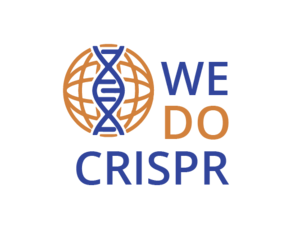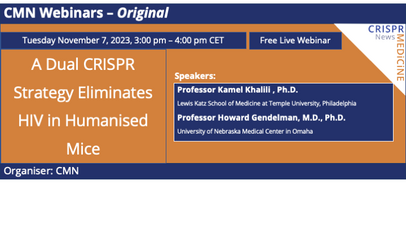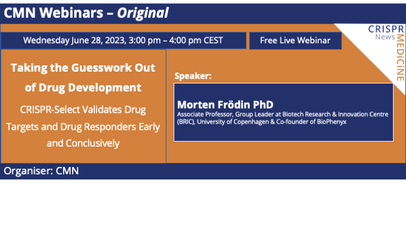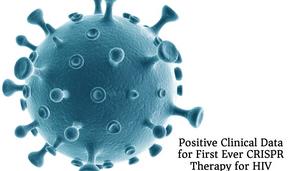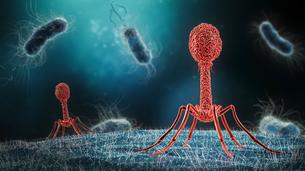Webinar
CRISPR-Based Control of Insect-Borne Diseases | Wed. March 30, 2022 | 3:00 pm – 4:30 pm CET / 9:00 am – 10:30 am ET | Free CMN Live Webinar
On-demand Webinar is available - Follow this link
CRISPR-Based Control of Insect-Borne Diseases
Mosquitoes are among the most widespread and dangerous vectors of viral diseases in the world. Aedes mosquitoes transmit notorious arboviruses such as Zika virus, yellow fever, dengue fever and chikungunya virus, collectively infecting hundreds of millions and killing many thousands of people each year.
Mosquito control has long been explored as a strategy to eliminate mosquito-borne viruses because the insect vector is critical for viral transmission. Traditional control strategies are primarily based on the use of chemical insecticides, which are expensive, harmful to the environment, and affect not only mosquitoes but also beneficial insects, e.g., honeybees, owing to their nonspecific nature.
Genetic control systems represent promising alternatives to better manage mosquito populations with fewer environmental concerns. Of these, Sterile Insect Technique (SIT) has been the most successful genetic control system used to date. Here, male mosquitoes are separated from females and then irradiated, leading to sterilisation via random genetic mutations or chromosomal abnormalities. Sterile males are then released into the wild to mate with wild females.
Despite its successes, however, SIT also has its limitations. These limitations prompted Professor Omar Akbari and his research team at the University of California, San Diego to turn to CRISPR to develop a more precise and scalable system for mosquito population control. This work resulted in the development of precision guided-SIT (pgSIT), a CRISPR-based molecular genetic control system that can suppress experimental populations of Aedes Aegypti.
Tentative Webinar Programme:
- 15.00 Welcome and introduction by CRISPR Medicine News
- 15.05 Omar Akbari PhD, Professor in Cell and Developmental Biology Section, Division of Biological Sciences, University of California, San Diego, USA. Presentation: Using Genetic Control Technologies to Control Wild Populations of Mosquitoes
- 15.50 Q & A with Omar Akbari
- 16.25 Close by CRISPR Medicine News
Speaker | Title:
Omar Akbari, Professor in Cell and Developmental Biology Section, Division of Biological Sciences, University of California, San Diego, USA | "Using Genetic Control Technologies to Control Wild Populations of Mosquitoes"
Speakers
Omar Akbari, Professor in Cell and Developmental Biology Section, Division of Biological Sciences, University of California, San Diego, USA

Omar Akbari received a B.S./M.S. in Biotechnology from the University of Nevada, Reno in May 2005. In December of 2008, he received a Ph.D. in Cell and Molecular Biology from the University of Nevada, Reno where he studied transcriptional regulation during development while working with professor Robert Drewell. He then joined the laboratory of professor Bruce A. Hay at the California Institute of Technology as a postdoctoral scholar where he used principals of synthetic biology to develop population control technologies for animals. In 2015, he became an Assistant Professor of Entomology in the Center for Infectious Disease Vector Research (CIDVR)at the University of California, Riverside. In fall of 2017, he then joined the faculty as an Assistant Professor in the Cell and Developmental Biology Section, within the Division of Biological Sciences, at the University of California, San Diego. In 2018 he co-founded Agragene a biotechnology based startup in San Diego, CA. In 2019 he was promoted to Associate Professor (w/Tenure), and to Professor in 2021.
Read also here the CMN interview we did with Dr. Akbari in 2021.
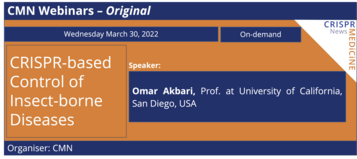
CMN Webinars - Your Gateway to CRISPR Medicine
If you have any questions or request for webinars, please contact us at: sales@crisprmedicinenews.com
Future CMN Webinars will be listed here.
Always stay updated - Sign up to weekly newsletter.
CMN Articles - Infectious disease

